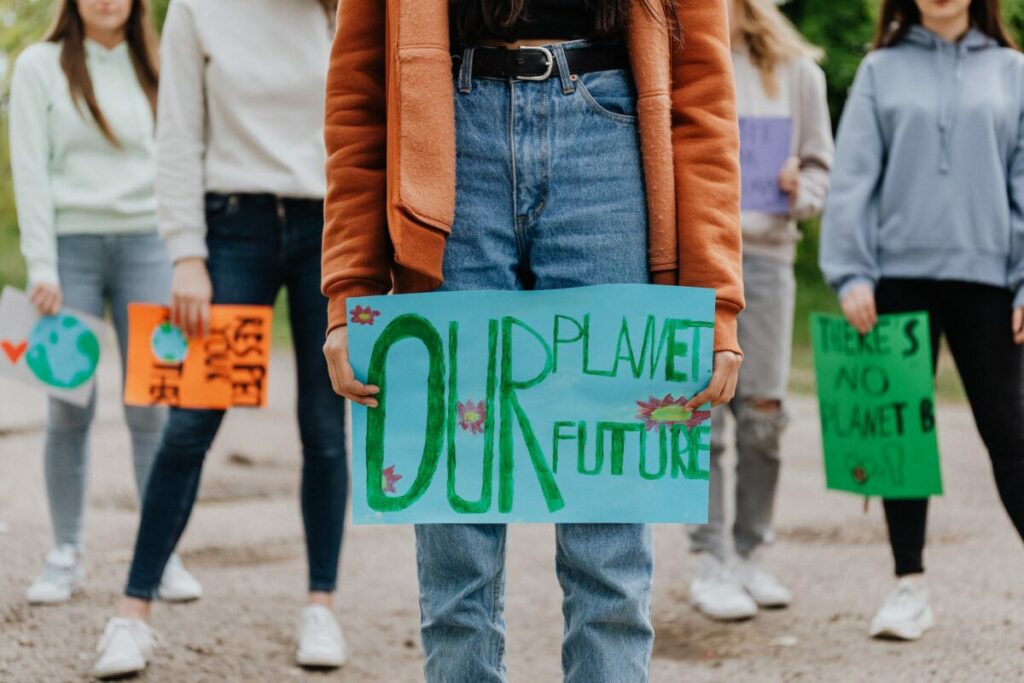
While climate change affects everyone, it can be especially anxiety-inducing for young people, who were born into a world in a state of environmental crisis.
College campuses – home to clubs, newspapers, debate teams, rallies and student governments – are hotbeds for climate activism. Some 81 percent of college students report being worried about climate change – and 74 percent say they want to get involved (or have already been involved) with efforts to get their towns to adopt more sustainable practices, according to a recent Student Voices survey conducted by Inside Higher Ed and College Pulse.
As students settle into dorms and finalize fall schedules, many are already making moves to raise environmental awareness. To get the bigger picture, we’ve rounded up some news stories highlighting how students, primarily women – who around the world face the greatest impacts of climate change – are taking action.
First up, on the front lines this fall semester:
- The two Ohio sophomores who started a climate club. Sophomores Maeve Fellerhoff and Celia Hawk were on a hike one day, talking about clubs at the University of Ohio, when they realized: none focused on environmental politics. That’s why they started a chapter of the Sunrise Movement – an organization dedicated to fighting climate change by supporting a Green New Deal – at OU. Fellerhoff and Hawk will serve as co-presidents, and plan to host a community event in October to spread awareness of the Sunrise mission. Hawk told school newspaper The Post that she feels like she’s making a difference that goes beyond recycling and living sustainably. “It’s a good way to feel like you’re causing real change and to get connected with people,” she said.
- Bookworms at State University of New York at Binghamton. Many members of the incoming class read an anthology of essays and poems written by over 60 women, called “All We Can Save: Truth, Courage, and Solutions for the Climate Crisis.” The book, edited by Dr. Ayana Elizabeth Johnson and Katharine Wilkinson, discusses climate through a feminist lens. All freshmen were encouraged to read the book so they could participate in the university’s Common Read Experience, which aims to help students “gain new perspectives on the most important issues of our days” and engage in constructive debate.
Next, the most optimistic people you’ll read about:
- The team of Harvard women sharing positive climate news. Students at Harvard’s Chan School of Public Health are using one word most people don’t associate with climate change: optimism. Their newsletter, “The Climate Optimist,” rounds up positive stories about climate change action, from JFK Airport’s new solar-powered terminal to California’s new rule that aims to reduce diesel exhaust from trains. Their goal is not to underscore the seriousness of climate change or to ignore the grief and loss that it has caused, but to acknowledge the progress that has been made and inspire readers to not give up hope. According to its homepage, “it’s like a breath of fresh air, straight off the blade of a wind turbine.”
And the winners of syllabus week’s “What I did this summer” icebreakers are…
- The Central Michigan University students who studied climate change in Antarctica. A group of students embarked on a two-month long Antarctic expedition to study climate change’s impact on biodiversity. During the trip, funded by the National Science Foundation, student researchers studied specimens that live on the bottom of the ocean and observed how they are adapting to shifts in climate. Jessica Zehnpfennig, a graduate student pursuing a doctorate in earth and ecosystem science, told ABC 12 she saw firsthand the effects of global warming while on the trip: “I know a lot of people don’t believe in global warming, but we see the ice is melting. And there’s definitely changes happening in the ecosystem down there.”
- The Bronx Community College students who spent two weeks in India. 17 BCC students traveled to India to install weather monitoring stations in communities lacking climate data. This is thanks to a prestigious grant the school received last year from the U.S. State Department of Public Diplomacy. While in India, students also led workshops on climate change to audiences of over 5,000 participants. One student, Irta Rrugeja, told CBS News that the biggest takeaway was “the relationships we fostered, so we can do more climate change initiatives, and spread awareness.”
Who’s celebrating a big victory:
- This plaintiff in Montana’s climate lawsuit. University of New Hampshire senior Georgianna Fischer, who grew up in Montana, is one of 16 plaintiffs who recently won a climate lawsuit against the state. The suit, which Fischer joined at just 17 years old, alleges that Montana’s permission of fossil fuel development violates the plaintiffs’ constitutional right to a clean and healthy environment. Before Fischer’s involvement in the suit, she had written a letter to the editor of a local paper expressing her concern over the state’s unusually sparse snowfall, which affected her training for cross-country skiing. The environmental sciences major told her school paper UNH Today, “I’ve always wanted to make a difference. Fighting to protect the places that I love and grew up in feels really good.”
Despite a big interest in sustainability, one trend has students divided:
- Commuting by plane. Many celebrities have been called out lately for their frequent use of private jets, with critics saying their privilege should not exclude them from climate-conscious travel. Now, the tables have turned as a number of college students have been flying frequently – except this time, it’s because of a lack of finances. A handful of students reported flying to classes and internships as an alternative to paying high rent prices. While one University of Virginia student commuted by plane every Wednesday from South Carolina to New Jersey for her summer internship, another UC Berkeley student took 238 flights to class over the course of one academic year. While many have praised the students for their resourcefulness, it’s worth noting that some social media users have left comments expressing concerns about CO2 emissions – especially considering that the UN warns airplane emissions are set to triple by 2050.
To wrap things up, we highlight young women who wrote op-eds on climate change:
- In her piece for BU Today, Boston University student Maura Lee reflects on the victory of Montana youth in their climate change lawsuit and the importance of young people speaking out against governments.
- Phoebe G. Barr wrote a scathing piece for The Harvard Crimson pointing out that administrators who “spend the day in air-conditioned offices” are not experiencing the effects of climate change in the same way as others on campus.
- Claudia Sachs, a student at Columbia University and a plaintiff in Virginia climate lawsuit Layla H. v. Commonwealth of Virginia, wrote about her experience in the courtroom for Columbia Daily Spectator.




